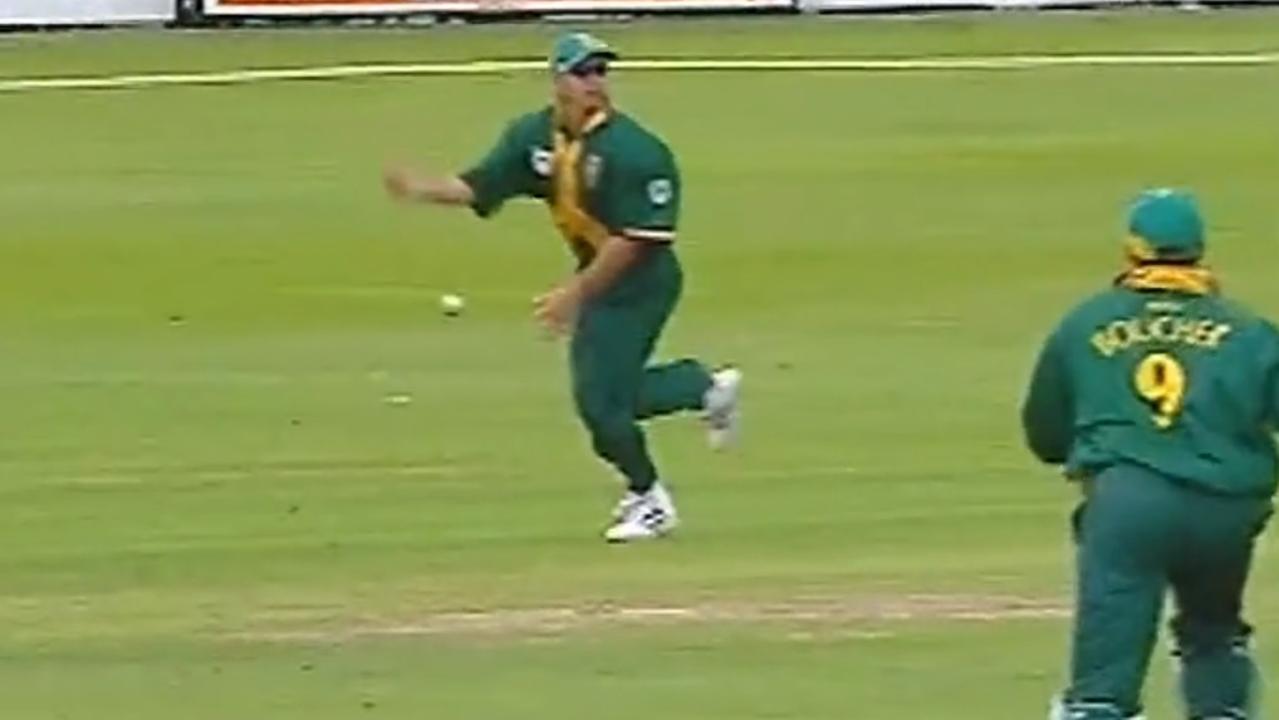Pakistani fielders try to catch two birds with one hand

Cricket
Pakistani fielders try to catch two birds with one hand
By Anees-ur-Rehman
Fielding plays a crucial role in cricket, often determining the outcome of the matches. Good fielding builds pressure on the opposition, forcing them to take risks and end up throwing wickets.
A sharp fielder can turn a half-chance into a wicket which alters the course of the game. Every run saved or extra run prevented due to efficient fielding can significantly affect the result of the match.
In modern cricket, where matches are often decided by narrow margins, a single run saved or catch taken can be the difference between the winning and the losing team.
“Catches win matches” is probably one of the most famous sayings in cricket – a favourite catch-phrase of commentators.
A well-timed catch not only dismisses a key batsman but also dents the progress of the opposition team.
Fielding – Pakistan’s perennial problem
Fielding is an old issue the national team is grappling with. Pakistan have wasted yet another golden opportunity to win a Test match in Australia after almost 28 years after Mitch Marsh capitalised on an easy drop catch by Abdullah Shafique to steer the hosts out of a historic collapse at the Melbourne Cricket Ground.
Marsh (96), along with Steve Smith (50), saw off Pakistan’s brilliant opening spell in the second innings of the Boxing Day Test, rescuing their team from 4-16 to 187 for six at the stumps on day three. This was Australia’s worst start to a Test innings at the MCG since 1911.
The pair put on a 153-run fifth-wicket stand to guide Australia to 262, setting Pakistan 317-run target for victory. In reply, Pakistan were bowled out for 237 runs, registering Australia’s 16th straight home Test win against the Men in Green.
Pakistan could have ended the losing streak had opening batsman Abdullah Shafique not put down a simple catch in the slips for the second time in three days. After dropping Warner in the third over of the match on day one, Shafique missed an easy opportunity to dismiss Marsh when Australia were struggling at 4-46.

Waqar Younis
“This was a big, big opportunity. This might be the difference between winning and losing this game,” Pakistan great Waqar Younis said during commentary.
“Pakistan fought so, so hard through all of this match and that catch might cost them this match.”
Ian Chappell
Australian legend Ian Chappell slammed Pakistan’s sloppy fielding during the ongoing three-match Test series in Australia. In an apt post, Chappell pointed out that legendary pacers Wasim Akram and Waqar Younis heavily relied on LBW and bowled dismissals, indicating a lack of trust in the fielders.
“At one point in their career the excellent Pakistan pace duo of Wasim Akram and Waqar Younis had claimed 60% of their Test and ODI wickets bowled or lbw. That’s an outrageously high figure and suggests the two fast bowlers knew not to trust their own fielders,” Chappell wrote.
Omar Kureishi
Come to think of it, our own (the late) Omar Kureishi, doyen of commentators, once described a dropped catch by a Pakistani fielder as “it seems he is trying to catch two birds with one hand.”
This is not the first time that the missed chance cost Pakistan the game. David Warner piled up 163 runs against Pakistan in the world cup encounter after he was dropped on 10 by Usama Mir.
There are several incidents where dropped catches have changed the complexion of the game.
South Africa vs Australia (World Cup 1999)
The most iconic dropped catch in cricketing history belongs to South Africa’s Herschelle Gibbs. Gibbs, who was one of the best fielders in the world at the time, dropped Australian captain Steve Waugh when he was on 56 on the bowling of Lance Klusener.
Steve Waugh is said to have muttered these words “You just dropped the World Cup” as he went on to make an unbeaten 120 and won the game for the Australians to make place in the semi-finals.
West Indies vs New-Zealand (World Cup 2015)
New Zealand opener Martin Guptill was dropped on 4 in the World Cup 2015. He was dropped by Marlon Samuels and then he went on make a brilliant 237 which is the highest run scored by any batsman in world cup history till date.
/origin-imgresizer.eurosport.com/2015/03/21/1440152-30799943-2560-1440.jpg)
Sri Lanka vs India (2014)
Sri Lanka’s Thisara Perera dropped Indian opener Rohit Sharma when he was batting on 4 and then the hitman piled up a massive 264 which is the highest individual score in an ODI.

India vs England (1990)
It was the first day of the test match and England's captain Graham Gooch was batting on 36 when wicketkeeper Kiran More dropped him on the bowling of Sanjeev Sharma.
Gooch then went on to score 333 runs and became the only triple centurion at the Mecca of cricket – Lord’s.




